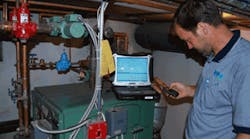Blackberries, iPhones and Droids are some of the popular handheld devices that contractors and service technicians are using on the job these days. There are many different handheld devices to choose from, all offering a variety of useful features. Some devices give technicians voice-activated driving directions, some have a camera, so technical problems encountered on a job can be photographed, and some handhelds can even capture customer signatures. Plus, there are a variety of applications many HVAC and plumbing professionals like to use as convenient jobsite tools.
iPhone apps
The iPhone and its applications are popular with many contractors and service technicians because the applications are helpful and convenient to use when on a job. Carmel Software offers 12 HVAC and mechanical engineering applications at the moment, and in July, a new application will be available, which is an HVAC load calculation tool based on Manual J.
According to Stephen Roth, principal, Carmel Software, applications are a convenient tool for the HVAC and plumbing contractor.
“You don’t have to lug it around like a laptop,” says Roth. “They are also very easy to use. You can use it right after downloading it. That’s why apps are popular with technicians. They are simple to use out in the field and can do quick analysis.”
Bob Rhines, design and sales, All Seasons Heating & Air Conditioning Inc., Yakima, Wash.,uses the applications on his phone when examining existing conditions that may be design problems causing the customer issues.
“I personally use a couple applications, the Duct Sizer and Psychometric Programs, by Carmel Software,” says Rhines. “Occasionally I'll use a level program to check if a thermostat on the wall is crooked.”
Randy Black, senior territory sales manager, Carrier Enterprise, Orlando, Fla., also uses applications from Carmel Software. He uses an application that helps him solve airflow issues.
“Since I work as a territory manager taking care of residential and light commercial dealers/contractors, I'm often called to a jobsite experiencing airflow problems,” explains Black. “Here in Florida that usually means the duct system is short on supply or return air and often both. The application allows me to input existing duct sizes and system parameters to help troubleshoot airflow issues. I find the biggest benefit of the application is I have ready access to duct sizing information on the fly.”
MultiEducator is another company offering applications for the HVAC and plumbing professional. Its Formulator series of applications was created specifically for plumbers, mechanical engineers and other trade professionals.
“I think our applications do two things for the contractor, first of all they let them easily do calculations in the field on whatever they are working on, such as the heating requirements of a job,” says Marc Schulman, a founder of MultiEducator, New Rochelle, N.Y. “The second benefit is sections of the code books are now part of some of the apps, so there is no need to lug around code books.”
The HVAC application includes the International Mechanical Code, and the plumbing application includes the International Plumbing Code.
“At the moment, with the exception of the Mechanical Code, which is all there, we currently have about one-half of each code in the corresponding applications programs,” Schulman says. “The next update to the Plumbing application will actually finish the regular code with the exception of the appendix.”
Payment solutions
Besides its many useful HVAC and plumbing applications, technicians can also process credit card payments on the iPhone with the use of VeriFone’s payment solution, a credit card encryption sleeve, for the iPhone. VeriFone’s card reader slips over the iPhone to accommodate card swipes, and incorporates a stylus for signature capture and a mini-USB port for charging the iPhone while the ergonomic reader is attached. The PAYware Mobile card encryption sleeve incorporates VeriFone’s end-to-end encryption technology and ensures secure payment processing.
Users also gain access to the PAYware Connect gateway, a customizable gateway service. Chase Paymentech is the preferred provider of new merchant accounts for buyers of VeriFone’s PAYware Mobile iPhone card payment solution.
Intuit GoPayment also offers contractors a way to process credit cards while in the field when a job is finished. All that is needed is a mobile phone with access to the Web, or the GoPayment application, and an Intuit GoPayment merchant account.
Different handhelds for different reasons
Besides iPhones, contractors also have other handheld options to choose from when deciding what product fits their business needs.
Doug Isley, L.E. Isley & Sons Inc., Westfield, Ind., stays in touch with service technicians via the Samsung SGH-I907, a touch screen phone.
“The dispatching over the phone has been great because the dispatcher used to get overwhelmed with the techs calling in for jobs,” says Isley. “Now he only gets called when there is something really needed and that allows him to focus on other things.”
At Legacy Plumbing, Rocklin, Calif., management is currently using Sprint’s HTC Droid phone, and field service technicians are using regular cell phones with texting.
“Currently we use them for e-mails, texting, and of course the basic phone features,” says Dana MacLean, business development, Legacy Plumbing. “The phone also gives the guys that are in the field a good camera. I also use it for spreadsheets.
“Most of the contractors I know are currently using Blackberries, for all the same reasons,” adds MacLean. “Those who want the ‘cool’ factor are going with the iPhone. The iPhone and HTC Droid, with all their apps make a nice choice for the salesperson in the field. One can do an estimate, send the quote, and process payment from the phone.”
MacLean is also a fan of the camera on the HTC Droid.
“The camera on the HTC is great (5.0 megapixels) and the ability to access the Internet has been nice when needed,” says MacLean. “It doesn't beat my laptop, but it is a good tool.”
Since service technicians at Legacy Plumbing only need to communicate with a general superintendent, they use a regular cell phone to text. However, MacLean thinks a Blackberry would be a good handheld for service technicians.
“With the right people the newer phones are a great tool,” says MacLean. “For a service technician in our line of work, the Blackberry would be more durable and has most all the applications we need.”
At Dalton Plumbing, Heating & Cooling, Cedar Falls, Iowa, managers use Blackberries and technicians use regular cell phones.
“The cell phones work fine for communicating with our technicians we dispatch through our Teletrac GPS system,” says David P. Krejchi, president, Dalton Plumbing, Heating & Cooling.“Texting costs and has limits on how much information can be sent. We do send reminders [text] to all of our techs for road condition updates and meeting reminders etc. … For our managers the Blackberry works great for texting and keeping caught up on e-mails, plus you can take pictures to document in the field to send, text or e-mail to a customer.”
At Moyer Indoor Outdoor, Souderton, Pa., management is using the Motorola Brute i680 on the Nextel System to communicate with field staff.
These units are easy to use, have a camera and have good text and e-mail capability,” says John Haley, operations manager, Moyer IndoorOutdoor. “Our dispatch software is set to automatically send the calls from our system to the handheld unit. We also have a number of laptop mobile devices that we use to dispatch our staff. The current model is a Panasonic Toughbook. This unit allows our field staff to look up customer history and billing information so that they are more prepared upon arrival.
“We have been using Brutes for about four months now with Nextel,” adds Haley. “We went with this since it’s a phone that pictures can be taken with.”
All service calls are dispatched to the technician via the phone. Service technicians receive the customer’s name, address, phone number and information about what the service call is for. When there is a problem on the job, the technician can take a picture with the camera phone and send it to a supervisor.
“We would spend a lot of time on the radio, talking, giving out directions, so with the technology this is all done in text, so they can read it at their convenience without disturbing them if they are with a customer,” explains Haley. “The camera phones have been a big plus. It’s helped us repair systems and get support to guys that need it while on a job instead of them coming back to talk to a supervisor, as they say, a picture is worth a thousand words. The camera phone has been one of the biggest advancements of the group. The Brutes are more on the rugged side, so they are holding up fairly well.”
Everyone picks this up [Brute and Toughbook] pretty quickly, even the senior guys,” says Haley. “If they don’t pick it up, they talk to another employee and find out how to use it. We’ve had very little push back from the techs based on the advancements in technology.”
At Roto-Rooter Services Co., headquartered in Cincinnati, an evolving handheld system is utilized at 60 company-owned and company-operated locations, enabling service technicians to increase productivity and customer service. At the moment, Blackberries are the handhelds used in the field and the third party vendor is Xora. A Bluetooth printer that’s battery operated is also part of the handheld system, which prints customer invoices. The printer, which is approximately 6-in. to 8-in deep and 5-in. wide, is attached by Bluetooth to the handheld, thus, printing information is sent through the phone, then the phone sends a printout to the printer through the Bluetooth. There is also a credit card swipe too, and there will be signature capture in the near future.
According to Steve Poppe, chief information officer, Roto-Rooter Services Co., the touch-data-once principle is at the forefront of the handheld system he has been spearheading.
“In the old days the technician would have to call the dispatcher or give them paperwork at end of the day,” explains Poppe. “Once they do all the work via the handheld, the information is updated in the backend systems, so they don’t have to spend time with that and spend more time with customers, thus, improving the customer experience.
“We were looking for ways to improve productivity and to eliminate paper work, which is a non-revenue generator for service techs — to get more information to them rather than via text messaging or using push-to-talk type of devices — and also give them better driving directions, and the ability to take credit cards and process them onsite,” says Poppe. “Blackberry also provides a good security system. The third party vendor we deal with is Xora, which has encryption capability.
“We are getting guys to the job faster, the right guys to the job, giving the best experience to the customer, and it’s all worked quite well,” adds Poppe.
Tablet PCs, laptops
Besides iPhones, Droids and Blackberries, some contractors are using tablet PCs and Toughbooks in the field.
At Moyer Indoor Outdoor, CF-19 Panasonic Toughbooks are used along with Motorola Brutes.
“At this point the Brutes work OK, but the Toughbooks really give you more flexibility,” says Haley. “Techs can review entire customer files and they can also key in what they did when they were there. So when they close out a call, the office knows what they did. We aren’t waiting for paperwork to come back to office to know what was done. We are slowly moving over to more Toughbooks.
“We have 14 Toughbooks out there now,” adds Haley. “There are another 25 technicians that use the Brute.”
At Frank Bonetti Plumbing, Castro Valley, Calif., Eee PCs by ASUS are being tested in the field and will probably be utilized in the near future.
“I did look a bit at handheld units; the problem that I found was no keyboard,” explains Dan Bonetti of Frank Bonetti Plumbing. “Right now we are field testing one of these units. We will most likely be going to the next size larger. Our goal is to stop the misplaced or lost work orders (job tickets), or unbilled hours that are not getting accounted for properly.”
Technicians at 1-800-PLUMBER, headquartered in Houston, are using Fujitsu tablets.
The tablets contain all job tickets, the home inspection sheet, video presentations, price book and a credit card swipe. With the tablet, jobs are priced and invoices and estimates can be printed or e-mailed directly to the customer. Also, all work performed and recommended can be tracked. The tablets also have a signature capture, both for approval before any work is done and after work is done to acknowledge the work was performed to their satisfaction.
When the job is completed, it is sent back to the office to be checked, and then it moves electronically into the accounting program.
“The use of the tablet creates a consistent experience for the customer, plus about 90% of the back office work is already completed,” says Keith Glass, director of training and technical services, 1-800-PLUMBER. “The owner benefits by reducing office staff and frees up his time to spend marketing and training his technicians. We have had good acceptance from the field. It makes their job easier and they like the fact that this is the latest technology.”
Boiler and pressure vessel inspectors at Insparisk LLC, headquartered in Glendale, N.Y., have used several tablet makes and models over the years, and currently are using IBM tablets.
“The tablets are loaded daily with the inspectors’ route information, allowing us to maintain a comprehensive log of each inspector’s work and output,” explains Stephen Kleva, president of Insparisk. “The inspectors also have some account information available to them, providing contact information and other types of information while in the field. They also completely eliminate the need for ‘paper and pen’ report entry, thus increasing the speed at which the inspector can complete them. This also translates into increased accuracy, as the tablet uploads inspection data to a main server and automatically completes the necessary jurisdictional forms for filing, thus eliminating the chance of data being transposed incorrectly.”
The IBM tablets offer real-time data uploads via wireless Internet hotspots.
“Not only does that further increase the speed at which reports are entered, it also means we can easily dispatch work to the inspector while he or she is in the field,” says Kleva. “Inspectors also use cameras that wirelessly connect to the tablet to record photos of equipment and deficiencies.”






